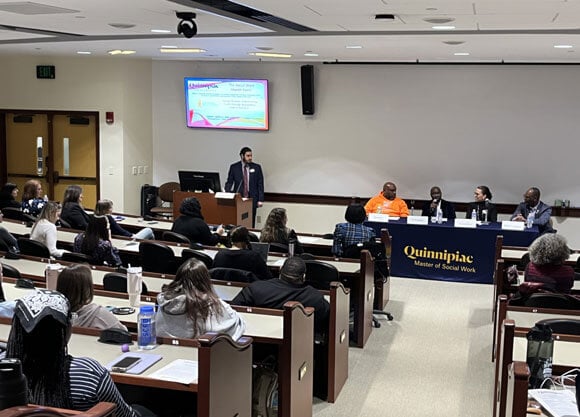
Powerful panel discussion inspires social work community on empowering youth through restorative justice practice
March 12, 2024

March 12, 2024

The panel was featured during Quinnipiac’s annual Social Work Month program for professionals and students. Social Work Department Chair and Program Director Carol Awasu, PhD, MSW, LMSW welcomed a large crowd of attendees to the event on March 1.
Awasu thanked the panelists for sharing their knowledge and experience and guiding the evening’s vital discussion. Awasu also invited each person in attendance to consciously consider and imagine the influence of restorative justice practice on society.
“What impact would practicing restorative justice have on our youth, our families, our schools, our communities?” Awasu asked. “How do we repair harm, take responsibility and accountability for our actions? How do we promote engagement? What must we do personally, professionally, collectively, to practice restorative justice?”
School of Health Sciences Dean Janelle Chiasera thanked Quinnipiac’s social work faculty for organizing the educational and inspirational event. Chiasera said the empowerment of youth through the transformative lens of restorative justice is an inspiring cause for discussion.
“I’m not surprised that our exceptional social work faculty and staff within the school at Quinnipiac are taking on this topic — a topic that provides a really powerful framework for justice, inviting us to move toward a model of healing, accountability, and restorative relationships,” said Chiasera.
Chiasera said the effort involves balancing the needs of the victim, the person who may have caused harm, and the community, in a way that preserves the safety and the dignity of all. Chiasera thanked all of the panelists for their participation.
“Across the four of you, you bring such richness to this conversation today, because of your work, experience, passions and your unique lens, and because of who you are,” said Chiasera.
Chiasera also welcomed back Nebiyou Masresha, MSW’ 23, LMSW.
Masresha, a veteran and immigration expert, is also the 2023 National Association of Social Workers (NASW)/Connecticut MSW Student of the Year. Masresha served as a panelist and additionally gave remarks on why NASW membership and advocacy matters.
Masresha shared details from impactful community programs and meetings he’s helped assemble within the City of New Haven, including those to help de-escalate police and first responder situations by increasing awareness surrounding mental health issues.
“This is where the advocacy part comes in, for you as a social worker. Looking at what the community needs are, and advocating for those needs, especially in terms of mental health in black and brown communities,” said Masresha.
Associate Professor Amber Kelly, PhD, MSW, LCSW introduced panelists Ray Boyd, Tai Richardson, and Lisa Simone, Ed.D., LCSW.
Simone is the developer and principal of five programs, including two traditional alternative education schools and three education programs within juvenile justice. The programs assist adjudicated boys, ages 14 to 18, so they can successfully navigate life in the community.
Restorative justice involves building relationships, said Simone.
“You can’t restore a relationship unless you build a relationship. I think that is the biggest element. And as social workers, we have to get that right from day one. For me, I work with students, judicial, state agencies and other school districts. Even though I work through a restorative lens every day with our students, I also do it with the adults. As a social worker, you are going to do that, with everybody,” said Simone.
Richardson shared his insights on restorative justice practice from several perspectives. Richardson is a juvenile probation supervisor in Bridgeport Superior Court. Within the branch, he is a member of the juvenile probation training advisory committee, employee wellbeing subcommittee, and an adjunct trainer of foundations of cultural responsiveness. He is also a certified trainer and facilitator in Advancing Youth Development through the Academy of Educational Development.
“It’s a labor of love, and most people that serve in these leadership type of roles, you do it for the more compelling ‘why’. Never lose sight of that,” Richardson advised. “Be that person that changed your life for someone else. Be that motivation and have the empathy to realize that this could be, this could be my child, my little brother, or my little sister. Center that in everything that you do.”
In addition to his work as program manager for New Visions for Public Safety at the Yale Law and Racial Justice Center, Boyd is also the co-founder of Skills of Socialization (SOS) at Osborn Correctional Institute, and the TRUE Reentry program at Cheshire Correctional Institution. Both programs provide hope for a new direction for incarcerated individuals. Earlier in his life, Boyd was incarcerated for 30 years, beginning at age 17.
In his advice to future generations of social workers, Boyd said that, from his experience, “the map is not the terrain.”
“You have this aspiration to help and to have an impact on so many lives, but the way you have it figured out in your head, you may have to reach some forks in the road; you may have to climb some steep hills to get to where you need to go. Find balance and don’t burn yourself out. Just remember, the map is not the terrain,” said Boyd.
Simone said the evening’s panel was a good representation of the layers of involvement, education, and experience that go into the work to empower youth through restorative justice practice.
“The four of us really represent that macro experience. We have life experience, through juvenile justice, through education, through social work education. You can’t do one without the other. When we funnel it all the way down, it’s that one youth, that one adult, that one client. But you need all of us to make that happen,” said Simone.
Quinnipiac Today is your source for what's happening throughout #BobcatNation. Sign up for our weekly email newsletter to be among the first to know about news, events and members of our Bobcat family who are making a positive difference in our world.
Sign Up Now